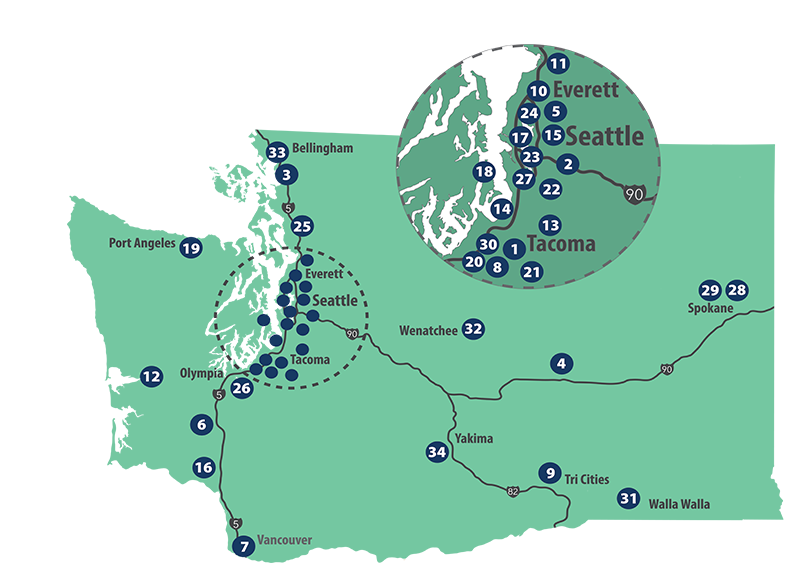Pre-major Phase (AA and AS)

Welcome to the pre-major phase page!
On the pathway map to becoming a RDN, the Associate degree in Arts (AA) and Associate degree in Science (AS) step is here:

Bachelor’s programs, such as one for Dietetics, are generally divided into two phases:
Pre-major phase
-
This is the phase before a student declares their major or before applying to be accepted into a major. Usually that means the first two years' worth of studies toward a bachelor’s degree—the Freshman and Sophomore years.
-
Pre-major means the time it takes to complete the first 90 credit hours under the quarter system toward a bachelor's degree.
-
It’s common for a student to complete their pre-major coursework at community colleges, since there are more of them and they tend to cost less. Universities also offer these courses, and if you’re eligible for certain financial aid, they can be just as affordable.
-
To earn their associate degree in arts (AA) or associate degree in science (AS), students complete 90 credit hours under a quarterly college system (or 60 credits under a semester college system). The 90 credits must cover required areas of study.
Major phase
-
This is the phase when a student has been accepted into their major. It usually means the last two years’ worth of studies toward a bachelor’s degree—the Junior and Senior years.
-
Major phase means the time it takes to complete the remaining, major-focused 90 credit hours under the quarter system toward a bachelor’s degree.
-
This is the phase where you’d transfer from a community college into a university.
-
Almost all bachelor’s programs that we list on the Bachelor’s degree and DPD page allow for students to transfer in with an AA or AS degree, as long as their degree includes the required prerequisites for the bachelor/DPD program.
Community and technical colleges in Washington State
All community and technical colleges on this map will be able to offer at least some of the required prerequisite courses for bachelor/DPD programs.
Select this Explore Our Colleges link to see all the college names listed on the map:

Community and technical colleges in Washington State with published information about a Nutrition-track include the ones listed below in the accordion. The remaining colleges shown on the map offer some form of transfer associate degree.
- Cascadia College
-
About this program:
- In Cascadia College's Pre-Nutrition pathway, you will be prepared for academic transfer to a four-year school and then graduate school for Registered Dietitian Nutritionist (RDN) degree, or the Pre-Nutrition pathway may be used as part of a shorter pathway to other nutrition related careers.
Attendance format:
- Coursework may be completed through a combination of in-person (web enhanced), hybrid and online modes, though not every course is offered in the same modality each quarter. Specific courses may be offered at certain times of the year.
Program website: https://www.cascadia.edu/academic-programs/health-and-wellness/pre-nutrition.aspx
Coursework checklist:
- https://www.cascadia.edu/academic-programs/health-and-wellness/pre-nutrition.aspx
- Look at the Courses tab
Tuition link: https://www.cascadia.edu/student-resources/academic-support/tuition-and-fees.aspx
- Columbia Basin College
-
About this program:
-
Although CBC does not offer a Nutrition degree, we can give you the foundation you need to transfer to one of the four-year institutions in Washington that provides this degree opportunity.
The Nutrition program can also prepare you with a unique perspective for a wide variety of degrees that CBC offers, such as Nursing, Dental Hygiene, Exercise Science and Early Childhood Education.
Attendance format:
- Classes are offered in a variety of formats, including in-person, online, and hybrid.
Program website: https://www.columbiabasin.edu/learn/discover-your-path/math-science-engineering/nutrition/index.html
Coursework checklist:
- Email mathscienceengineering@columbiabasin.edu for transfer coursework map
Tuition link: https://www.columbiabasin.edu/i-am/current-hawk/pay-for-college/tuition-affordability.html
-
- Everett Community College
-
About this program:
- This program is designed to prepare students to transfer to a bachelors' degree program in nutrition.
Attendance format:
- Combination of online and in-person required
Program website: https://www.everettcc.edu/programs/pathways/program-maps/nutrition-dta
Coursework checklist: https://drive.google.com/file/d/1f8KQC4wUhwGHRFfR57RZCRbiPDuc-VZQ/view?usp=sharing
Tuition link: https://www.everettcc.edu/enrollment/tuition/tuition-rates/
- Seattle Central Community College
-
About this program:
- This two-year pathway is designed for students who wish to complete an Associate of Arts - Direct Transfer Agreement degree with a concentration in Nutrition Science. Students in this program will study how nutrients and food components influence growth, metabolism, health, disease and includes human behavior as it relates to food choices.
- This program prepares graduates for entry-level positions in traditional health settings such as hospitals, private medical offices, and public health agencies, as well as integrative health and wellness organizations and companies. It can also prepare graduates to transfer at the junior level into a food science, nutrition science, or related program at a four-year college or university.
Attendance format:
-
Classes are offered in various formats such as online (e-learning) and may not be offered each quarter.
Program website: https://seattlecentral.edu/programs/nutrition-science
Coursework checklist: https://seattlecentral.edu/programs/nutrition-science/nutrition-science-associate-arts-direct-transfer-agreement-lasdtaa
Tuition link: https://seattlecentral.edu/enrollment-and-funding/enrollment-and-admissions/tuition-and-payment
- Shoreline Community College
-
About this program:
- The 90 credit Associate in Arts transfer degree is designed to meet the general education requirements at Washington State four-year institutions and prepares students for a Bachelor of Science degree in Nutrition and Food Science. Some Nutrition and Food Science programs require additional science and math courses beyond what is required by the AA-DTA degree; depending on your area of interest and where you plan to transfer, you may want to consider an Associate in Science Transfer (AS-T) Track 1 degree.
Attendance format:
- In-person courses
Program website: https://www.shoreline.edu/programs/general-transfer/nutrition-and-food-science-pre-major.aspx
Coursework checklist: https://www.shoreline.edu/programs/general-transfer/nutrition-and-food-science-pre-major.aspx (scroll to 'Courses and Requirements')
Tuition link: https://www.shoreline.edu/apply-and-aid/cashiering/tuition-fees.aspx
- Skagit Valley College
-
About this program:
- The Associate of Arts, Direct Transfer Agreement, AA-DTA with Nutrition Emphasis prepares students for a career in nutrition, by setting them on the path to earning a bachelor’s degree in nutrition/dietetics or becoming a Registered Dietitian Nutritionist (RDN). Nutrition professionals can work in many different capacities, depending on level of education achieved, credentials, and specialization. These can include nutrition counselor, clinical dietitian, health educator, sports nutritionist, employee wellness instructor, food scientist, public health dietitian, or corporate dietitian.
Attendance format:
- Classes are offered in a variety of formats, including in-person, online, and hybrid.
Program website: https://catalog.skagit.edu/preview_program.php?catoid=32&poid=8470
Coursework checklist:
- https://catalog.skagit.edu/preview_program.php?catoid=32&poid=8470
- Scroll to the Sample Schedule Option
Tuition link: https://catalog.skagit.edu/content.php?catoid=32&navoid=3013#tuition-fees
- South Puget Sound Community College
-
About this program:
- By studying nutrition, you will acquire foundational knowledge for future studies in health- or fitness-related fields and learn how to improve your personal health. If you decide you want to pursue nutrition as a profession, SPSCC is an excellent place to take prerequisite science courses, such as biology and chemistry, before transferring to a 4-year college or university to finish your bachelor’s degree.
Attendance format:
- In-person
Program website: https://spscc.edu/healthcare/nutrition
Coursework checklist: Choose from:
Tuition link: https://spscc.edu/financial-services/tuition
- South Seattle College
-
About this program:
- This pathway is designed to meet Associate in Arts degree requirements with an emphasis in nutrition science. Nutrition science is the study of how nutrients and food components influence growth, metabolism, health, and disease and also includes human behavior as it relates to food choices. It is a multi-faceted and cross-disciplinary field, encompassing chemistry, biology, physiology, and public health. Nutrition scientists work to develop, extend, and apply all aspects of nutrition through research to improve clinical practice and public health.
Attendance format:
-
Most courses are offered M-TH, M/W, or T/TH during the daytime (between 8-1:30 p.m.) on-campus, online, or in hybrid (part on-campus, part online) format. We also offer some evening courses twice-a-week and science courses may include afternoon labs (between 1-4 p.m.). For the most recent class times, visit the online class schedule.
Program website: https://southseattle.edu/programs/nutrition-science
Coursework checklist:
- https://southseattle.edu/programs/nutrition-science/nutrition-science-associate-arts-direct-transfer-agreement-lasdtaa or
-
https://southseattle.edu/sites/default/files/inline-files/Nutrition%20ScienceProgramMap.pdf
Tuition link: https://southseattle.edu/tuition-and-fees
Tribal colleges in Washington State
Please see the Governor's Office of Indian Affairs' Tribal Directory for Washington State Tribal Colleges.
Required prerequisites to enter bachelor/DPD programs
All of the bachelor’s degree/DPD programs we list on the Bachelor’s degree and DPD page ask for prerequisite courses. Many of these are courses, if not all, you can include in your studies so they can count toward your AA or AS.
Important: Different bachelor’s degree/DPD programs require slightly different prerequisites. Always start by looking at which schools you are interested in transferring to!
Common prerequisites for bachelor’s level Dietetics programs include:
-
General Chemistry
-
Organic Chemistry
-
General Biology
-
Microbiology
-
Human Anatomy
-
Human Physiology
-
Human Nutrition introduction
-
Psychology
-
Statistics
Sample schedule
Here is a sample schedule that shows the full-time flow of studies toward gaining an associate in arts degree with a focus on Nutrition Science. Note that these schedules are listed to give you a general idea. Some universities will require slightly different classes than the ones listed below, and some community colleges won’t offer all the required classes. You’ll always work with an advisor at your college of choice to set course schedules that will transfer to your bachelor’s degree/DPD program of choice.
Year One
Quarter One
-
ENGL&101: English Composition I (5)
-
MATH&146: Introduction to Statistics (5)
-
HEA 125: Health and Wellness (5)
Quarter Two
-
CHEM&121: Intro to Chemistry (5)
-
NUTR&101: Nutrition (5)
-
CMST&220: Public Speaking (5)
Quarter Three
-
PSYC&100: General Psychology (5)
-
CHEM&131: Intro to Organic Chemistry and Biochemistry (5)
-
CMST 245: Media Communication and Criticism -or- ART 170: Photography as an Art Language -or- MUSC 109: World Beat: Global Studies Thru Music (5)
Year Two
Quarter Four
-
BIO&160: General Biology w/Lab (5)
-
ENGL&102: Composition Il (5)
-
ANTH&206: Cultural Anthropology (5)
Quarter Five
-
PHIL 110: Intro to Social Ethics (5)
-
BIO&241: Human Anatomy & Physiology I (5)
-
CMST 205: Multicultural Communication -or- HUM 210: Intro to LGBTQ Studies -or- ENGL 116: Graphic Novels (5)
Quarter Six
-
BIOL&260: Microbiology (5)
-
BIO&242: Human Anatomy & Physiology II (5)
-
PSYC 225: Psychology of Addiction -or- HIST&128: World Civilizations III -or- ENVS 170: Energy & Resources: Now & Future (5)
